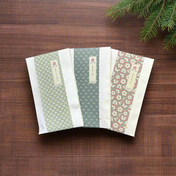Where is Wazuka?
Wazuka is a town in Kyoto Prefecture famous for its high quality tea. The farming families in Wazuka have been producing Ujicha for over 800 years. Today around 300 farming families still live in Wazuka.

A tea processing factory sits at the edge of a tea field. Photo taken by Victoria Garafola in Wazuka, Kyoto.
Art Appears
Tucked away between rolling tea fields and old wayside homesteads is a handmade art sanctuary. The house is called “Wazuka oka no ue no ie (和束町丘の上の家).” This can be translated as “The house on the hill in Wazuka.” The home is open to travelers, foreign artists, and anyone else who can make their way to this remote respite.

Finished silkscreen stencils lay outside the art house in Wazuka. Photo taken by Victoria Garafola in Wazuka, Japan
Two years ago this home was nothing more than another dilapidated house. There are many of these peppered throughout the Japanese countryside. Today, it is a beautiful place which works to bring art and events to the community.

The house on the hill can be seen in the distance. Photo taken by Victoria Garafola in Wazuka, Japan
Since then, the owner and his team of volunteers have worked to make the building a habitable home for art and various events.

Visitors are free to take a stroll around the endless tea fields that surround the area. Photo taken by Victoria Garafola in Wazuka, Japan
Art Events
On Monday, October 19th, the home was opened for yet another event. This time it was a silk screening DIY pizza party!
Pizza baking in a handmade stone oven overlooking tea fields. Photo taken by Victoria Garafola
Participants paid just ¥1500 for all-you-can-eat pizza and the opportunity to use equipment to make their own silk screen eco bags.

Artists prepare to make the silkscreen stencils. Photo taken by Victoria Garafola
Upon arrival, pencils and paper were passed out and people got to work creating their designs. Some traced preprinted designs, others drew freehand. After drawing the design and tracing it on to a transparent screen, we were able to get to work making the silk screen stencil.
The first part involved covering each screen with an emulsion solution and allowing the newly painted screens to dry in their homemade drying box.

Artists rinse off their stencils to clean away residual emulsion. Photo taken by Victoria Garafola in Wazuka, Japan
After applying the emulsion to the screen, designs were placed over the screen and put above a special UV light box. This impressed the image into the screen.
Each color is hand mixed allowing for artistic variety and a handmade feel! Photo taken by Victoria Garafola
Afterwords, artists took their screens outside to rinse off before the final step. Once the stencils were made, the last step was to mix the ink and learn how to successfully transfer the image onto our new canvas bags.

One participant prints his design onto the canvas bag. Photo taken by Victoria Garafola


